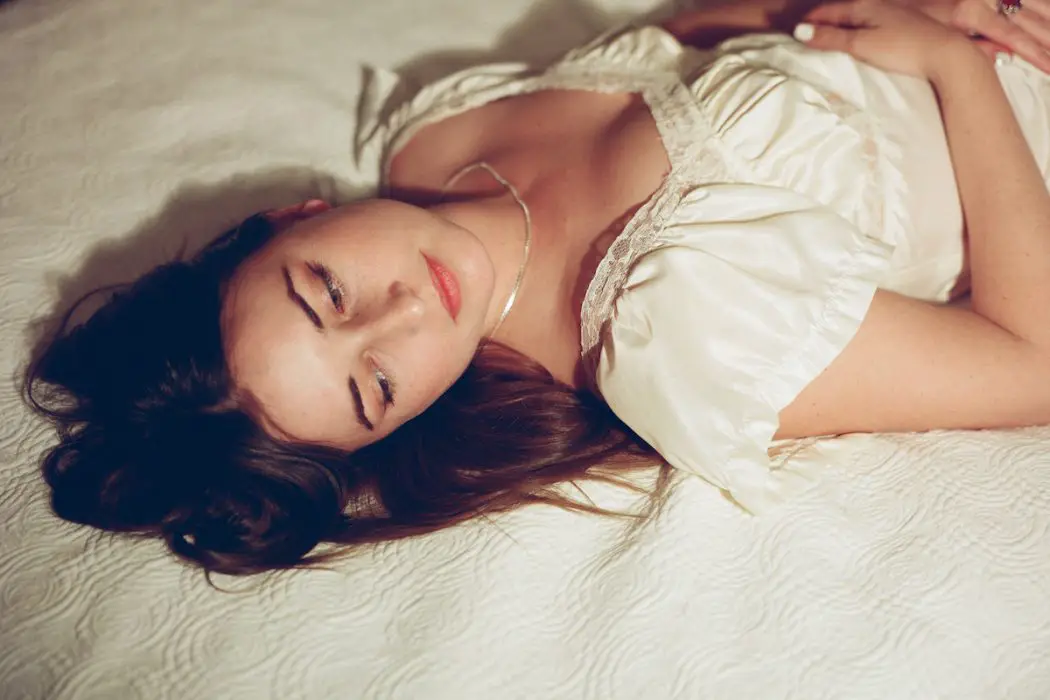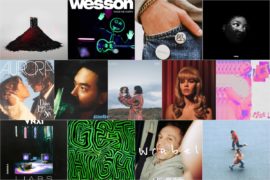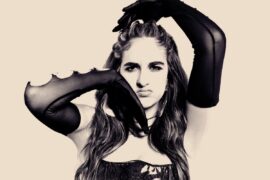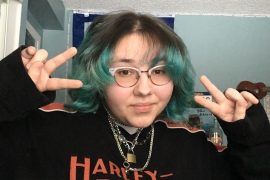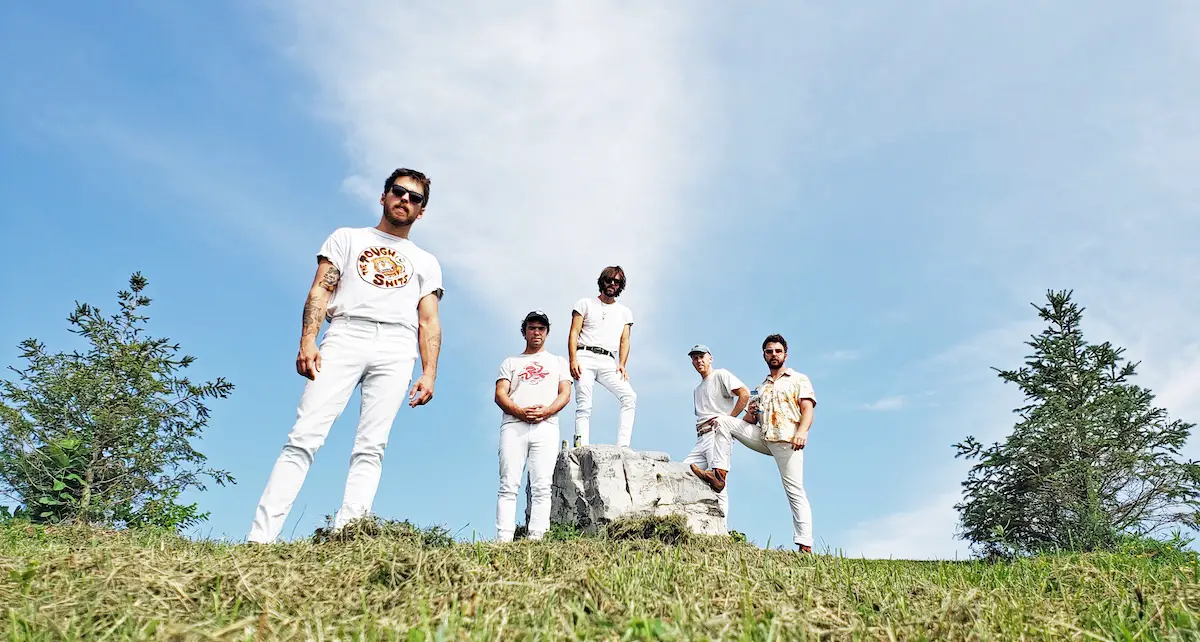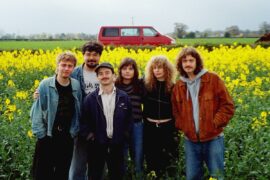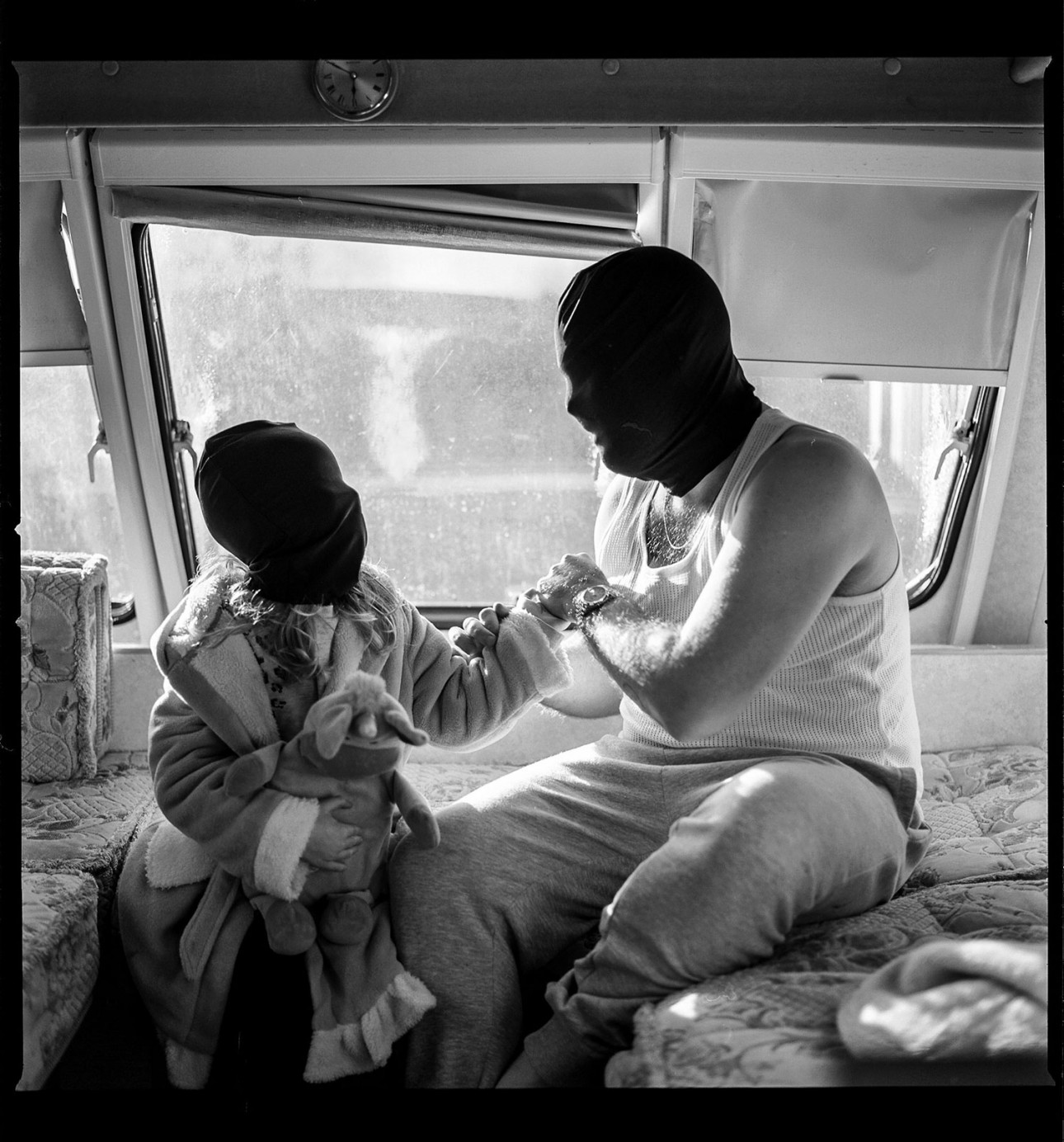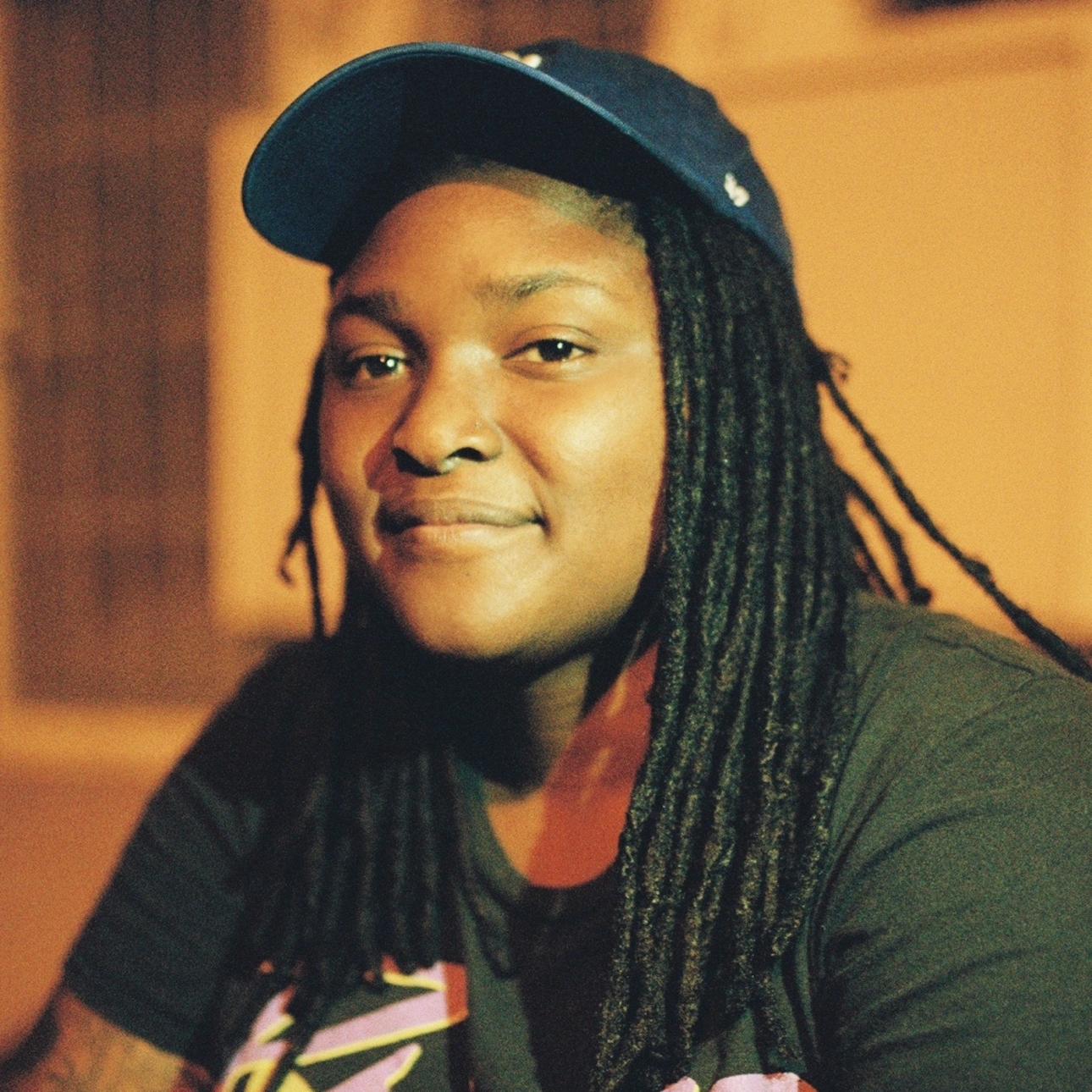Texas-born songwriter Jess Williamson talks the trials and triumphs of womanhood, modern pop inspirations, and trying to find comfort in being alone – all while reflecting on new album ‘Sorceress’.
Stream: “Smoke” – Jess Williamson
https://www.youtube.com/watch?v=vINgxOeiCoQ
As women were expected to shoulder a lot, to shoulder domestically, within relationships, within a family, within friendships, and to be able to do it with a smile on our face. I wrote ‘Sorceress’ coming from a place of feeling like I needed to have supernatural power to be able to make certain things work.
Jess Williamson truly has a way with words.
Her fourth album Sorceress – out Friday, May 15th via Mexican Summer – takes listeners through unmarked valleys, across dusty plains, and over rambling rivers to meet her various characters and soak up their saturated stories. This artwork reflects on the itches and pulls of aging, stares down the great enemy named loneliness, and battles societal pressures relating to womanhood, social media, and the capitalist system. It’s complex like unexpected threads interconnecting into a woven, vibrant tapestry; a tapestry filled with images that feel distant, but if you lean in close you’ll realize they connect intimately with you.

Sorceress paints against the canvas of the Southwest with cowboys, coyotes, tiny towns, horses, and freedom all comfortably finding their place within the tracks. Sonically, the album features a folk foundation with flashes of psychedelic distortion, sixties rock ballad energy, and country sonority.
On Sorceress, modern indie pop influences appear as new, but welcomed additions to Jess Williamson’s musical toolbox. Colorful synths greet us in “Infinite Scroll,” sparkling, bubbly percussion flurries carry us away in “Love’s Not Hard To Find,” and winding, rhythmic guitar strums guide us in “Wind On A Tin.” Similar to the mystery of the old West, these surprising sound experiments add a mystical spirit to the tracks and poignantly highlight the uncertain, wandering feelings of the lyrics – especially within the chorus of “Infinite Scroll.”
You watched me laugh in the face of the clock
And fall downstairs with barely a knock
I was on one then, really leading the pack
Swearin love can’t die when I believed that
Time did unfold like an infinite scroll
– “Infinite Scroll,” Jess Williamson
“Ponies In Town” draws our attention as a profoundly interesting track, both on sonic and lyrical levels. At first, the simple story begins with only an acoustic guitar to back it up, but near the finale, Williamson’s voice strengthens and converses with the distorted trills of a flute. This musical exchange takes place around the line, “Free as a bird til the end of the cage,” reminding us that our idea of freedom may look one way, and truly be a cage the next.
I knew a man who kept his ponies in town
We could see em running from the highway
Dig in your heels, hold tight to the reins
Free as a bird til the end of the cage
– “Ponies In Town,” Jess Williamson
Although Sorceress grapples with many values regarding the human experience, from a bird’s eye view, this album contends the most with connection:
Connection to the Earth, to others, to nation, to time, to God or another deity, and – above all – to one’s self. Opening number “Smoke” toys with the give and get of relationships against a playful, acoustic melody, while “Sorceress” haunts with cricket buzzes, deep bass strums, and clarity regarding the weight of womanhood. Then, with gospel-folk exuberance, “Rosaries At The Border” offers a powerful voice to asylum seekers as the U.S.-Mexico border and confronts the founding principles of America as a Christian nation. Powerful feels like an understatement in the shadow of these songs.

Though this track enters last, “Gulf of Mexico” stands out as a poetic summary for Sorceress. Spirituality, love, aging, the metaphysical, society, relationships, and womanhood all tangle, touch, and dance within a winding, ethereal soundscape to bring the entire work to a radiant conclusion.
A woman goes through phases and
A woman goes alone
I can’t quite explain it
Cause I don’t always know
My body’s here and aging and I’d rather be at home
Than having this cool conversation at the Gulf of Mexico
– “Gulf of Mexico,” Jess Williamson
Not one drum kick, one flutey vocal whistle, or one solitary word feels out of place on Sorceress.
Jess Williamson’s fourth album was undoubtedly crafted with delicate care and intentionality as a gift for listeners to relax into, wrestle with, and simply live within during times of sadness, joy, or isolation.
You know, as I’m getting older, I guess I’m realizing that we are always alone. You know, you go through life alone, and people come and they walk alongside you on your path for a while and then your paths go different directions. And that’s okay.
— —
:: stream/pre-order Sorceress here ::
Stream: “Wind on Tin” – Jess Williamson
:: A CONVERSATION WITH JESS WILLIAMSON ::
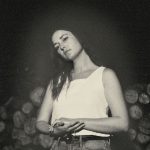
Atwood Magazine: Hi Jess! This is Baylee, how are you today?
Jess Williamson: Hi! I’m fine. I’m doing well, it’s actually a very nice day here today. How are you? Are you in Memphis? What’s it like there?
Well we've been shut down for a while now in Memphis. Our county and mayor actually shut us down before the rest of Tennessee. It hasn't gotten out of hand, thankfully, but our mayor's just deciding whether to open us up in a few weeks or not.
How are you? You're in LA, correct?
Williamson: Yeah, I’m in LA and I’m not sickm and so that’s good. I’ve just been, honestly, kind of enjoying this time. I mean, it’s bad timing for my record. That’s something I couldn’t have even imagined affecting an album. So, I’ve been grieving that, of course, but I’m learning a lot of lessons from this time, that have been really valuable and that’s really helping me get my priorities straight you know?
Definitely, I think a lot of people are kind of using staying at home to reassess priorities and reassess how busy our lives really were. But yeah, it is a weird time to release a record but I really enjoyed listening to record I'm excited to talk to you about it today. Are you looking forward to releasing it?
Williamson: Yeah, I am. I’m excited to get it out in the world.
That's so good I'm so happy for you. Well, I'm glad you're good, glad you're healthy, glad your family and friends are healthy. Mine all are as well. But I'd love to just jump in if you're ready to go.
Williamson: Totally.
This new album and choosing to host this interview is my real introduction to you as an artist, which I was really excited about. I love your music, love your lyricism, and I really adored your album. With Sorceress, I loved a lot of the themes that you wrestled with in this album. One that really stuck out to me was the idea of the untamable woman, and women living alone and aging alone. How did you develop these themes and what kind of drew you to the word ''sorceress,'' specifically, your album title, and what kind of drew you to writing about lone women?
Williamson: Yeah, great question. Well, I named the album after the song “Sorceress,” which I feel conceptually sums up a lot of what the whole album’s about. Which is essentially being a woman, and not being a sorceress, but being expected to be one. As women were expected to shoulder a lot, to shoulder domestically, within relationships, within a family, within friendships, and to be able to do it with a smile on our face. I wrote it coming from a place of feeling like I needed to have supernatural power to be able to make certain things work. So every song on the album, for the most part, features a central character or a woman who on some level is needing to be a kind of supernatural, larger than life, kind of figure for one reason or another.
As I’m getting older, I guess I’m realizing that we are always alone. You go through life alone, and people come and they walk alongside you on your path for a while and then your paths go different directions. And that’s okay.
I think I’m becoming more comfortable with being alone. Yeah, I don’t know, it’s a hard question to answer because I don’t agree that the whole album is about that but, yeah, definitely some songs touch on that especially “Gulf Of Mexico.” That song is actually inspired a lot by – did you ever see that movie 20th Century Women?
No, I haven't!
Williamson: It’s a Mike Mills movie, I’m pretty sure, and it’s about the relationship of this mother and her son. There’s this amazing scene in the movie where the mom is talking to her now teenage son’s girlfriend. And she’s talking to her and she’s says, ‘You are the one that’s with him out in the world.’ And she’s saying that you know him in a way that I don’t know him. That really affected me. This idea that, we only know one side of the prism of a person, right? For example, the way that I know my best friend is different than the way that her boyfriend knows her, or the way that my mom knows me is different than the way someone I work with knows me. In particular in that movie, the idea that a mother can only know her son one way, and someone else is going to know him a different way. Those are some things I was thinking about while writing these songs.
I love that. I think that the characters you created are really powerful and you can definitely hear them in the album, the different voices and things that you wanted to incorporate. It's really beautiful.
Williamson: Thank you!
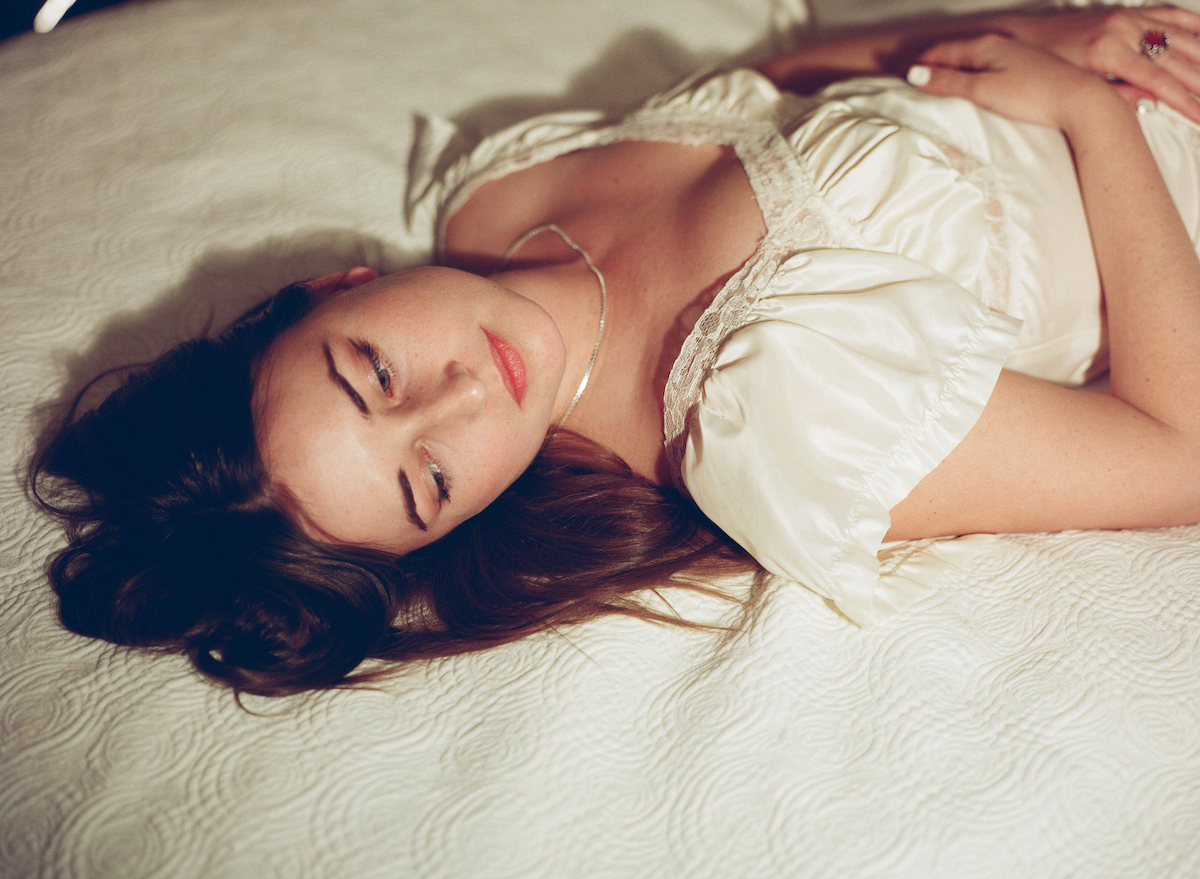
Of course. One song that really stuck out to me as a separate character and one song that was really powerful was ''Rosaries at the Border.'' It's really poetic, visual, and beautiful. What drew you to this character, to this woman, and why did you choose to add this song to your album?
Williamson: I wrote that song when Trump was separating children from their families at the border, when that was all happening and is kind of still happening. And I was really – obviously – really affected by that as a lot of people were. I felt pretty powerless and felt really sad. And I imagined – I can only imagine – how heartbreaking and soul crushing it would be to be a woman trying to escape a dangerous situation to give yourself and your children a better life only to end up in this ‘supposedly’ safer place. To then be imprisoned and have your children taken away from you. I was thinking a lot about how this is supposedly a Christian nation. And I was thinking about the figure of Jesus Christ. And I’m not a specifically religious person. I have become more spiritual in the last few years than I have been in my whole life with my own version of spirituality. I grew up Christian and I know a lot about the teachings of Jesus Christ. They’re all really solid, you can’t really argue with them. Jesus was the person that was hanging out with the lepers and the prostitute, he he was turning the tables in the bank and telling everybody, all the supposedly religious people that they were doing it wrong because they were. I was thinking about what Jesus would think of what America was doing to these please people coming here legally seeking asylum – it’s not illegal. That’s where that song came from. I was thinking about the story in the Bible where the prostitute came up to Jesus and washed his feet with her hair and put perfume on his feet while the ritual leaders were all making fun of her. Yeah, and that that’s where that song came from, really as sort of an apology as well.
Well, I think it's amazing that you gave a voice to some people who are really voiceless right now and their voices have been taken from them. Thank you for writing that song and painting the picture so vividly. So, you mentioned that the past two years have been transformative for you. I know it's been two years since your last album released Cosmic Wink. What what has changed? Both with your approach to music making and what has influenced this album that maybe didn't influence Cosmic Wink?
Williamson: One big thing is I started writing songs on the keyboard. I was always writing on guitar before, which for me really roots the song in like a country or folk or rock place. And starting out writing on the keyboard because I didn’t really know how to play. I took a couple lessons and I learned some chords, but I really appreciated coming to it with a total beginner’s mind. It helped me get out of my own way, in thinking that I needed to make it musically sound interesting, all I could really do was pound out chords, and it became this blank slate. For me writing a song on a keyboard, it means it can go anywhere it could go in any direction and sort of genre-less. It just became this container for the song, like an open field that the song can sort of fit in, and become anything. I wanted to step outside of the genres I was more comfortable with for this record and move more into a pop direction, but also bring in some country elements. So starting the songs on the keyboard, really helped me think in a new way about the songs. It helped me open up what might be possible for them sonically. So musically that really helped. I also wrote a few song on an omnicord. Do you know what that is?
I've definitely heard the word but please describe it for me again.
Williamson: It’s an instrument from the 80’s. I don’t think they make it anymore. Basically, it has buttons that you push for all the chords and it also has this pad on the side that you can stroke. It almost sounds like a harp. It also has a drum machine which is really helpful. So I used that to write a little bit on this record too, which again helped to open my mind sonically. I did write a couple on the guitar, like I wrote “Ponies In Town,” “Sorceress,” and “Rosaries At The Border,” they all started on the guitar. Then sometimes it started on the keys ended up on the guitar. “As The Birds Are,” I wrote that on the keyboard and ended up being a mostly guitar song on the record which is cool. Same with “Wind On Tin,” I wrote that on the keys, but it became a mostly guitar song later on. But yeah, I think that’s what really influenced a shift in the sound.
Yeah, well I think the shift in your sound is really apparent for example, some songs especially ''Infinite Scroll'' you can hear it almost immediately with the more pop and psychedelic feelings, very atmospheric to me. So what inspired you to go more in a pop direction this time, rather than in the country roots? What drew you to go more outside of your grounded folk sound?
Williamson: I started listening to more pop music, and realizing I liked and it was really interesting. I hadn’t really been paying attention, honestly, to a lot of pop music, and I’m such a music fan. For me, I felt there was so much to discover that was – like old folk music from the 60s and 70s and stuff like that – and I just hadn’t been paying attention to pop music. I started listening to more pop music and realizing that it’s really weird. That there is there’s so much experimentation going on, and it’s actually really heady and really cerebral in some cases and really strong, and poetic, and cool, and exciting, and I just hadn’t noticed. I just wasn’t paying attention, and I just started paying attention, and it was really inspiring for me. I wanted to open up more and see what that I could do for my own songs.
That's awesome. I actually am a big fan of pop music. It's funny because when I tell people that I love pop music, they're like, 'Oh, okay. Like what?' and I always say, 'No, you don't understand. There's really amazing pop music being made right now with so many different influences.' I don't know pop to me just means you just you pull in a lot of influences and you make something that really means a lot to you.
Williamson: Well right now I think that pop and indie and and rock or all swirling around together in a really interesting way. The lines are completely blurred, there’s really no more distinction anymore.
Yeah, genre-bending and genrelessness is a real topic right now, especially among writers, because genre is how we've always really classified and described music for so long. but it's almost not even useful anymore.
Williamson: Actually, people always ask me, what kind of music I make, and I don’t know what to say.
It's hard, well, especially because a lot of your songs are really different from each other - especially on Sorceress.
Williamson: That’s true, yeah, that’s true.
So continuing on - Oh, I did want to ask since you started paying attention to pop music: are there any modern or any artists who really inspired you on this album specifically with pop music?
Williamson: Yeah, Kacey Musgraves, and FKA Twigs, and Maggie Rogers. And those, I’d say those are the main specifically pop artists that I started listening to that got me excited about pop music.
That's awesome. I was gonna say, especially since I know you're from Texas and you do have some country influences, that you really reminded me of Kacey Musgraves with this album. So I hope that's a compliment for you!
Williamson: Oh totally, no I mean that record Golden Hour. So good.
Yeah, it's amazing. I love Golden Hour. In a different direction, most of your songs on this album don't conform to the traditional song structure. All your songs feel more raw and they feel like you were thinking out loud, with really telling the stories, not from a place of conforming to a certain pattern. I was interested if that was intentional, or if that was just how the songs developed organically, or even if you didn't even notice that with your songs.
Williamson: Definitely intentional. Everything about this record, I think the reason that you feel like it’s more raw, is because it’s the first time that I really knew what I wanted. I had a really clear vision, and I was uncompromising in it. You know, it’s funny, when I talk about it being more pop I guess I’m more talking about the weird stuff I’m hearing in pop music. Like FKA Twigs, her songs don’t conform to the typical pop song structure either. Also Perfume Genius, another example of what I consider pop music, but it’s very strange.
So it was intentionally in that I wanted to do something new and create something that felt really new. Some of that is drawing from things that are traditional and some of that is stepping out of the box entirely. So that’s what I did with this album, bringing some non-traditional song structures to the mix with some sonic elements that we hear in pop music but maybe lyrics that we don’t. Then the pop thing – it’s funny – because it’s not every song; it’s just sprinkled in. That was fun, but then there’s songs that are really raw folk songs that feel really me as well.
Yeah, definitely. I think one of those more raw songs - at least for me - was ''Ponies in Town.'' I loved that track because of the story. I especially loved the lines, 'Am I aging well, am I just an aging well / Every day we get a little further on the trail.' And I think it's interesting that you said you wanted to do something new because I agree. This record feels fresh and different, but it also really incorporates older Western symbols and stories like 'Ponies In Town' about a man with horses in town. Specifically with this track, I was wondering what inspired it, but also if you want to expand on what drew you to the old Western symbols and the Southwest energy that is sprinkled in throughout this album?
Williamson: Well I’m from Texas, and I’ve spent a lot of time in the Southwest. I live in LA now, and for whatever reason over the last couple of years, I have made that drive so many times between Austin and Los Angeles. I’ve stopped and spent time in a lot of places in between, a lot of deserts. I love that part of the world so much, and I’m endlessly inspired by the imagery of Texas landscape and by the culture. That’s what I grew up with and so it’s what I’m always thinking about and how I’m filtering my experience of being alive. I filter out these symbols that I’m so enmeshed with. So for me lyrically, it’s just what I know, and so it’s just my framework for viewing the world.
That song “Ponies In Town,” it’s really a meditation on mortality and worth and capitalism. This idea of a man with his ponies in town. Why do you have a horse in a city? For any reason other than capitalism? I’m so endlessly inspired by the symbol of the horse because I grew up with horses. My aunt was and still is a real Rodeo Queen. She has horses, she has a little ranch, which is where we shot all the photos from my album. Now, she does cutting. Do you know what that is?
No, no idea.
Williamson: It’s basically – I don’t totally know all the in’s and out’s – but it’s a competition with horses, where you get on a horse and you separate one cow from a group of cows. It’s a very intricate thing and it’s really interesting to me. Anyway, when I was really little, I was riding a horse and I fell off. I was probably four or younger and I broke my arm, and it was a pivotal moment for me. I’ve kind of been scared to ride a horse ever since then. I’ve been in awe of horses ever since. My whole life, I think they’re beautiful. I think it’s amazing the relationship that we can have with horses and I also think it’s sad that you have to break a horse. You have to train a horse to ride it and any kind of training of any kind of animal is usually based on a system of punishment, and them them fearing pain.
And so, that song is a lot about singing about these horses being in town. You know, and why would they be and where would they rather be, and feeling a kinship, perhaps to that, as people, as women. You know people are sort of enslaved to capitalism right? Like, we all have to work? And this moment is making a lot of us question that. And women often are judged by, their worth is judged by their own fertility and at a certain age it’s you have a kid or what’s wrong with you as you must be damaged in some way. Right? Those were a lot fo the ideas of swirling around in my mind. And that last line is, ‘Free as a bird to the end of the cage.’ Feeling a bit like a caged bird.
Yeah, I love that line and I loved how you stretched it out at the end. The kind of minute long drawing out of that I think was really representative of free as a bird until you hit the end of the cage. It can look like freedom but is it really?
Williamson: Yeah, I feel like you really get it! No one ever asks me about that song, and it might be my favorite song on the record really. I never get to talk about it so thank you.
I thought it was beautiful. I actually have two questions about it!
So I really love the lyricism in the story and hearing about how you came to write that song is so interesting. But I also really loved the musical interlude at the end that I was starting to speak about. I think that throughout this whole album, you really focused on the importance of the sonic energy, and how it relates to the stories. What were your thoughts - especially with the ''Ponies in Town'' interlude - around the sonic energy for this album? That interlude specifically adds an energy to it at the end that isn't there at the beginning.
Williamson: Well, I love that you’re asking about this song, and it’s kind of hard to put into words. Because the way that I write songs, and decide on the instrumentation is really intuitive and sometimes it feels like it’s coming from somewhere else like it’s coming from my unconscious mind. With that one, it just occurred to me, almost like a vision, that it would be cool to have that song be a play between an acoustic guitar and a flute. So that sound that you’re hearing at the end is actually a flute that we ran through some effects, some distortion, and made it sound interesting. It was really just a vision that I felt could be a cool moment on the album that would have a really folk root and feel like a bit of a pause in the record to kind of slow down for a second, and more so have an intimate moment with just me, the listeners, the guitar, and the flute. I wanted the vocal at the end to represent the bird. So it’s like a bird singing, and it’s like the bird and the flute are having a competition that’s how I thought of it. That’s how I brought it to the table, I wanted it to be a competition between the vocal and the flute and at the end I want the flute to win. I mean, I’m saying that and it maybe sounds so out there, but this is what it is to make a record with me. This is how I talk about music, you know? ‘I want it to be like a competition between the vocal and the flute, where they go back and forth. And then I want the flute to win. And then I’ll sing the last line of the song and the song is over. So that’s what’s happening.’
Well that's really cool. I don't even remember what music I was listening to the other day but I'm definitely someone always drawn to lyricism, but I think we've almost been drawn too far to lyricism and forget that like the instrumentation can really make people feel certain ways without any words necessary. And so, I was thinking about what are my favorite like musical interludes and songs that only sounds make me feel emotions. So I love that you took a moment to think about that.
Williamson: Thank you.
I also really loved ''Gulf Of Mexico.'' I know you mentioned that it was kind of written around this movie that you saw. I just want to say as a Southerner and someone who goes to the beach in the Gulf of Mexico. I was like, wow, this song really paints a vivid picture for me. I can picture it.
Williamson: Yay!! Awesome.
And I think I was really drawn to the lines, 'A woman goes through phases and a woman goes alone / I can't quite explain it because I don't always know.'
Williamson: Isn’t that the truth?
Oh, yes. When I first heard that, I couldn't put into words how unbelievable how true it is. But please you can react to that.
Williamson: I can’t quite explain it because I don’t always know. I feel like, as a woman I have spent my whole life trying to explain it, but I don’t always know. And I just feel like that’s a line that every woman will understand.
It was funny because I heard it and I thought, 'That doesn't fully make sense but I get it in my soul.' But we've already talked a bit that sometimes in your album you wrestle with this idea of a woman aging alone, and why can't a woman be happy if she ages without finding a partner or without having children? Why can't a woman be comfortable with being alone? And so I guess my question is, what would you say to someone who is uncomfortable being alone and why can being alone be a really powerful thing?
Williamson: I understand because it’s actually my biggest fear ending up alone. I really don’t want to, but I don’t know why I don’t want to. I mean, I know that I want to have a child. And I’ve started to release this idea that the person that I have a child with is also someone that I will co-habitate with my entire life after that. That certainly releases some pressure and I’ve become a lot more open minded about more non traditional orientations of families. I have a non traditional family; my parents aren’t married anymore, but they’re still really close friends and we do holidays together. And we’re still a family. You know I’ve been spending a lot of time alone obviously in the quarantine and the other night I was sitting in my house, I had all my candles going, I looked around and I thought, ‘Why am so afraid of this when it’s so pleasant.’ *laughs* What is the problem here?
And I think actually it’s the great work of my life to become comfortable being on my own completely. I’m a really social person and I like to see people, I like to be around people. The truth is if I can let go and enjoy just being alone it’s really magical. So I’m still working on it and I don’t have the answers, but I can tell you this: being lonely when you’re in a relationship is way worse than just being alone. A lot of this record has to do with feeling alone, and not being alone. And that’s a lot worse. So, I don’t have the answers. I’m still fumbling my way through it.
I love that you just talked about being alone, because it is a feeling everyone goes through and everyone is kind of fearful of, but as we grow older, you are alone most of your life like what you said in the beginning of the interview.

So I just have one more question. Obviously this album really works together as a full bodied work, and people should listen to the full album, but if people only have time to listen to one track, which one would you suggest as like a way to really get to know Sorceress and Jess Williamson?
Williamson: “Gulf Of Mexico.”
Any reason for that song?
Williamson: I don’t know, I just I love that song. It was almost a single and then we decided against that. I think conceptually it sums up the whole record.
I love that. I think ''Gulf Mexico'' is my favorite track if I had to choose one. Well, thank you so much for your time today, Jess. I'm looking forward to releasing this piece!
Williamson: Thank you, thank you. This was so nice.
— —
:: stream/pre-order Sorceress here ::
— — — —

Connect to Jess Williamson on
Facebook, Twitter, Instagram
Discover new music on Atwood Magazine
? © Kathryn Vetter Miller
:: Stream Jess Williamson ::

